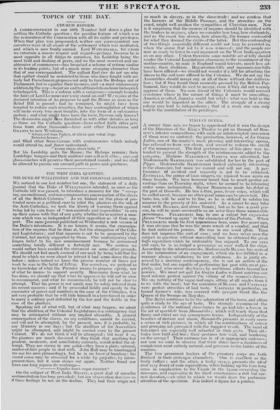ITALIAN OPERA.
A SHORT time ago, we began to apprehend that it was the design of the Directors of the Kings Theal re to put us through all Ros-
sm's inferior compositions, with such an uninterrupted succession
of them were we surfeited: the production, however, of La Gazza Ladra, one of the masters most pleasing and interesting operas,
has relieved us from our alarm, and served to redeem the credit of the management. The first performance of this piece was in- tended to present the strength of the reinforcements added to the
company. Madame MALIanna.si GARCIA was advertised, but Mademoiselle BARTOLOZEI was substituted for her in the part of Pippo. Mademoiselle llawronozzi looked extremely interesting
in the character, but more we cannot and will not say. A per- forniance of accident and necessity is not to be criticised.
UCHELLI, the prince of bass-singers, we rejoiced to see again on these boards. We have however heard him to much greater ad- vantage than on Thursday night, when he seemed to be labouring under some indisposition. Signor BORDOGNI made his debut in the part of Gienetto. He has a thin, poor, tenor voice, which will be called sweet, because no other good name can be given to:it. His taste, too, will be said to be fine, as he is obliged to subdue his manner to the poverty of his nzateriel. As a singer he may lake rank with BEGREZ, and above TORRI j but as he has a good per- son, he will be more serviceable as an actor than those immovable personages. PELLEGRINI has, to use .a vulgar but expressive phrase "turned up again" in the character of the Podeea. When PELLEGRINI made his first appearance here, some five year ago, it was obvious that he was the mere wreck of a vocalist, and that he had outlived his powers. He was in one word effile. Time does not improve thus sort of case ; and we have never seen the subject in question without marvelling how he obtained the great kfro reputation which he undeniably has enjoyed. To our eves. and ears, he is as insipid a personage as ever walked the stage. According to the advertisements, Mademoiselle BLASIS has arrived at the termination of an engagement, which she has fulfilled in a manner always satisfactory to her audiences. As is justly ob- served by a morning contemporary, she is not an artiste of the first order, but one capable of performing her part with great pre- piety, and who never displeases by ambitious efforts beyond her powers. We must not quit La Gaza Ladra without entering our most solemn protest against the villany of the women's dresses. We say nothing of the sugar-loaf caps, sitting at all alleles from 5 to 85 with the head ; but the costumes of Beasts and CAsreem were perfect atrocities of bad taste. CASTELLI in particular, an honest farmer's wife, was covered with gewgaw tinsel like the Queen of the Sweeps on May-day. The Ballet continues to be the admiration of the town, and offers quite a study to the eye of taste. We strongly recommend the gentlemen of the national show-boxes to go and take a lesson in the art of spectacle from Alasaniello ; which will teach them that finery and effect are not synonymous terms. Independently of the beauties of motion and music, Masaniello presents in every scene a series of rich pictures, in which all the combinations of colour and grouping are presented with the happiest result. The band of fishermen are especially well schooled in their parts. Their att- tudes how bold and free ; their gestures how wild, and bordering on the savage ! Their costume too is .of on appropriate rudeness'; nor can we omit to observe that thew shuts have a duskiness of complexion most entirely natural, and germane to the habits of the wearers.
The two prominent leaders of the piscatory corps are both finished in their grotesque characters. One is excellent as the burly ruffian ; and the other, a lanky sava:.e, presents the id(al (not very beau) of rude superstition, when holding up his lean long arms in supplication to the Virgin in the hynm succeeding the massacre, and expressing in his fixed countenance a dull but ear- liest devotion,—an effect to which we would draw the particular attention of the spectator. It is indeed a figure for a painter.


















 Previous page
Previous page